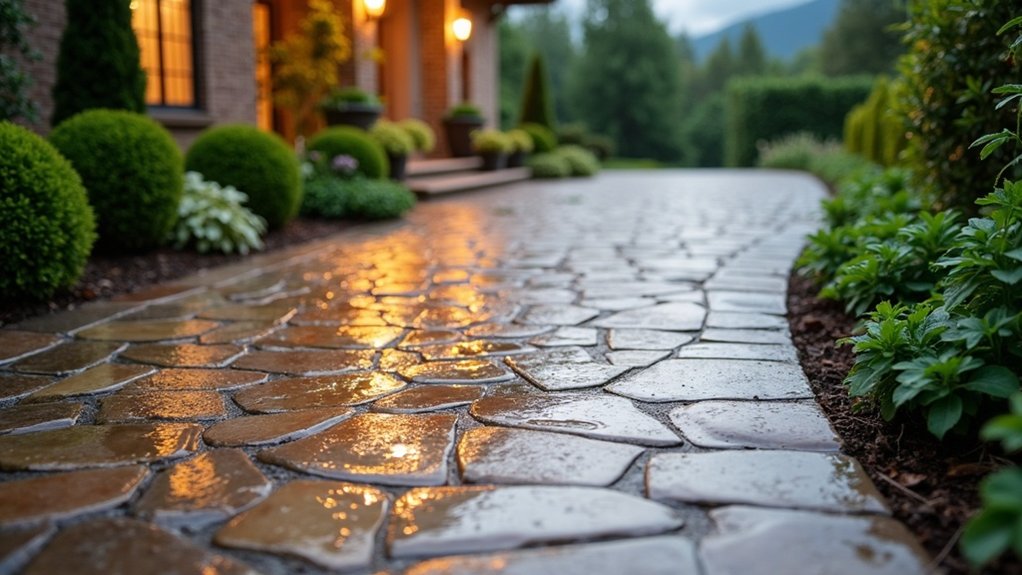Resin-bound driveways hold up brilliantly against Britain’s unpredictable weather, thanks to their clever design. The flexible resin mixture expands and contracts with our fluctuating temperatures – much like how a woollen jumper stretches without losing its shape. These surfaces cope well with summer heat waves and don’t soften like traditional tarmac. They’re also UV-resistant, so they won’t fade or deteriorate under the rare British sun. Best of all, their permeable surface handles our frequent rain perfectly, preventing those annoying puddles you’d find on concrete drives. Quality installation and materials are crucial – think of it as building a house on proper foundations – ensuring your driveway stays robust through all seasons.
Key Takeaways
Resin-bound driveways handle British weather brilliantly. They flex naturally with our changeable temperatures – much like a good pair of wellies – preventing those nasty cracks you’d see in concrete.
The tough resin mix stays firm even during those rare scorching summer days, whilst special UV protection keeps the colour from fading in the sun (unlike those tired-looking tarmac drives you see everywhere).
One of the biggest perks for UK weather is how well these surfaces drain. When it’s bucketing down, water simply soaks through rather than forming puddles, which is particularly handy during freezing winter spells.
To keep your drive tip-top, just give it a regular sweep and reseal every few years – think of it like applying a fresh coat of wood stain to your garden fence. Dead simple, really.
Thermal Expansion and Contraction Management
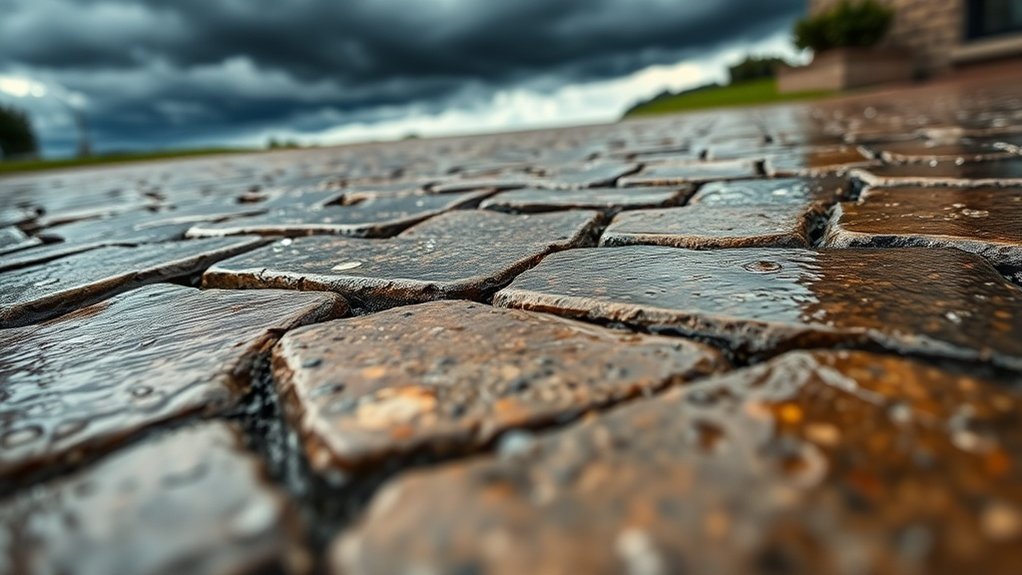
Resin-bound driveways naturally expand and contract with temperature changes, much like how a garden path feels warmer and slightly larger on a hot summer’s day. These movements can create small cracks in the surface, particularly troublesome during British winters when water seeps in and freezes. To tackle this, you’ll need: – A flexible resin mix that moves with the temperature (think of it like a stretchy jumper rather than a rigid coat) – A properly prepared base layer to spread the weight evenly – Good drainage to prevent water pooling. Regular maintenance is key – treating your driveway with sealant works like a protective coat, stopping water from getting into any small cracks. Additionally, addressing insufficient base preparation is crucial to prevent movement and settling that could worsen cracking. It’s also important to ensure that you use quality materials for the resin, as this affects the durability against harsh weather conditions. With these measures in place, your resin-bound driveway should handle our British weather cycles without major issues.
Heat Resistance and High Temperature Behavior
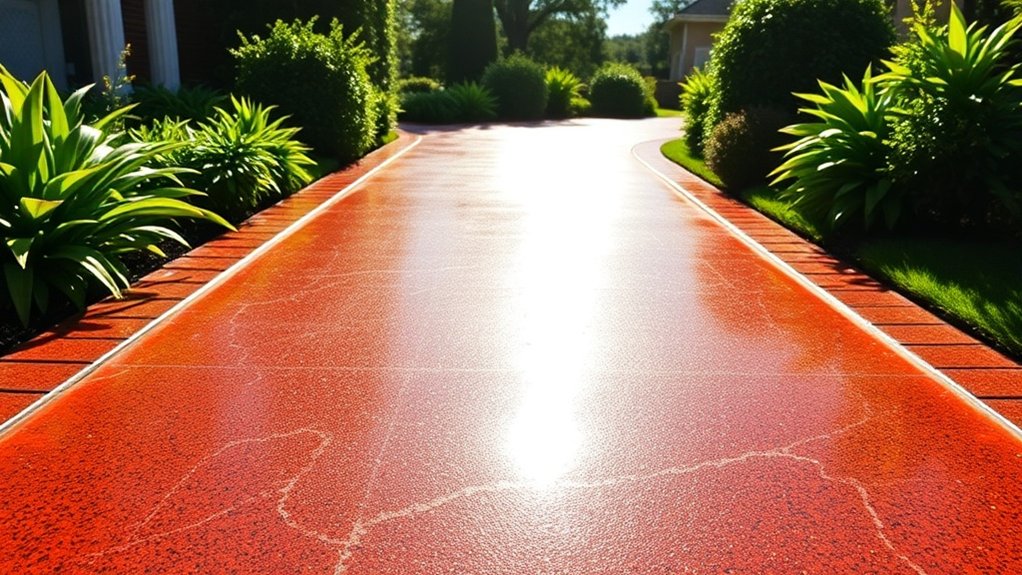
Resin-bound driveways handle heat exceptionally well, with melting points of roughly 200°C – far higher than traditional tarmac or asphalt. This means your driveway won’t soften or warp, even during the hottest British summers. Quality resin mixes stay stable under direct sunlight, though it’s worth choosing UV-resistant options for the best long-term performance. Their superior thermal characteristics ensure that they can withstand even the most intense sun exposure. Additionally, the use of UV-stable resin helps prevent yellowing and fading, maintaining the driveway’s aesthetic appeal year after year.
High Melting Point
Resin-bound driveways offer excellent heat resistance, with melting points around 200°C – far higher than tarmac, which starts to soften at about 50°C.
Think of a chocolate bar melting on a hot summer’s day versus a sturdy plastic container; that’s the difference in heat tolerance we’re talking about.
The resin’s tough molecular structure keeps the surface stable even during lengthy spells of hot weather. Unlike cheaper alternatives, a properly laid resin driveway won’t buckle or form ruts during heatwaves. It can flex slightly with temperature changes, preventing cracks from forming. This makes resin driveways particularly well-suited to the UK’s increasingly warm summers, maintaining both their looks and structure year-round. Additionally, the lower thermal conductivity of resin ensures that it cools down quickly once the heat source is removed, enhancing comfort during hot weather. Furthermore, the unique formulation of resin driveways provides flexibility and resistance to cracking, which is essential in extreme temperatures.
Heat-Tolerant Resin Formulas
Heat-tolerant resins are specially designed materials that maintain their strength in extreme temperatures where standard resins would fail.
These formulas resist UV damage and heat whilst remaining flexible enough to prevent cracking – much like how a quality rubber mat stays pliable in hot summer sun. The resins include special additives that reflect heat, similar to how white paint keeps buildings cooler, and they disperse heat quickly to avoid damage.
Unlike regular resins that might warp or puddle in the heat (think of a plastic garden chair left in direct sunlight), these materials keep their shape even during temperature swings.
They’re particularly useful in British conservatories and south-facing installations where summer heat can be intense.
Thanks to special heat-resistant colours and polymers, they maintain their appearance and durability even in challenging conditions, providing a reliable surface that won’t deteriorate in hot weather.
Structural Integrity Maintenance
Maintaining the structural integrity of resin-bound driveways requires proper management of temperature changes throughout British seasons.
Think of how your garden decking expands and contracts – resin surfaces work similarly but handle these changes better.
Resin surfaces prove remarkably tough, adapting to size changes whilst keeping their strength.
Getting the installation right is crucial – proper groundwork and laying techniques help prevent cracks from forming when temperatures shift.
For larger driveways, expansion joints might be worth considering, though they’re not always needed with resin.
Unlike traditional tarmac that can soften on hot summer days, resin stays firm thanks to its high melting point of around 200°C.
It warms up gradually, which means it’s less likely to damage during heatwaves and keeps its grip and appearance.
Even during those rare scorching UK summers, your resin driveway won’t warp or deform.
This natural flexibility means your driveway can handle everything from winter frost to summer heat without falling apart – particularly useful given our unpredictable British weather.
UV Stability and Sunlight Exposure
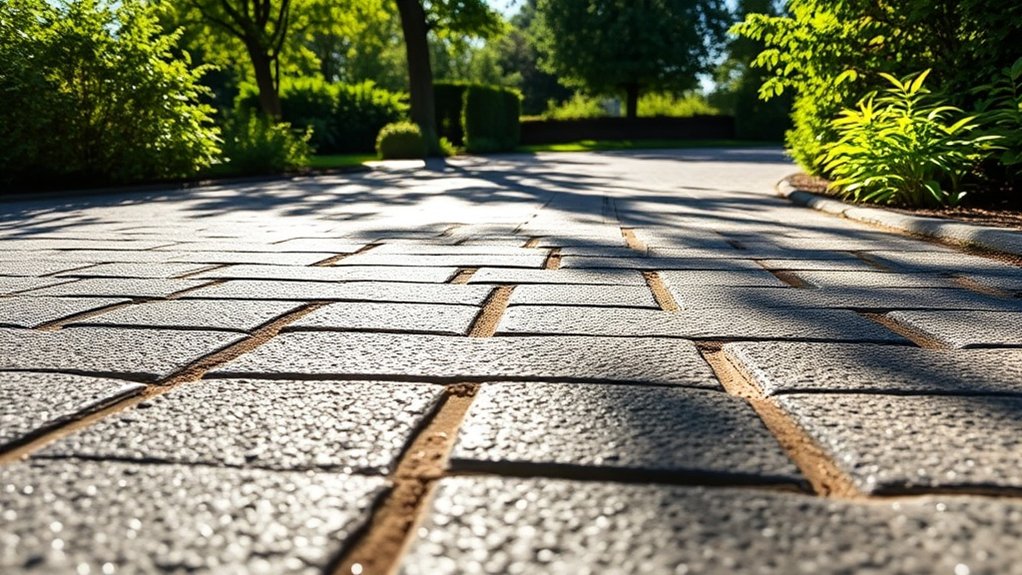
Selecting UV-stable materials for your driveway is essential in the UK, even with our often cloudy weather. Quality resin-bound surfaces need UV-stabilised resin to maintain their appearance and strength over time.
Think of UV protection as sunscreen for your driveway – without it, the surface can yellow and fade within weeks, much like plastic garden furniture left out in summer.
The best resin driveways use special UV-resistant compounds called aliphatic polyurethanes throughout the material, not just on top. This means the protection runs deep, rather than being just a surface coating that could wear away.
Good UV-stable resin offers two key benefits:
- Prevents discolouration and keeps the original colour true
- Maintains structural strength against sun damage
Whilst UV-stable resin costs more initially, it’s worth the investment to avoid a patchy, yellow driveway that needs replacing sooner than it should.
Most UK suppliers now offer UV-stable options as standard, but it’s worth double-checking this detail before purchase.
Permeability and Water Drainage
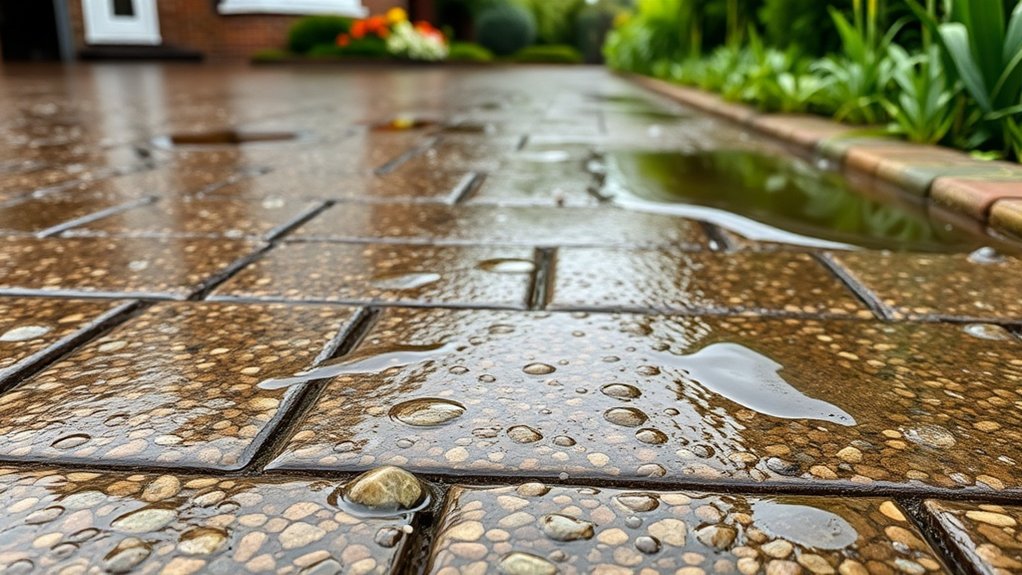
Resin-bound driveways offer excellent drainage thanks to their porous surface, which lets rainwater soak through naturally.
This means no more puddles forming on your drive during heavy British rain, and less worry about local flooding issues.
Much like a sponge, the surface takes in water and allows it to drain properly into the ground below – a particularly useful feature given our wet UK climate.
The permeable nature of these driveways makes them both practical and environmentally sound, helping to manage our increasingly unpredictable weather patterns.
Enhanced Rainwater Management
Resin-bound driveways excel at managing rainwater thanks to their porous design. Unlike traditional surfaces, they let rain filter through naturally, much like a coffee filter lets water pass whilst catching the grounds.
This clever system prevents puddles from forming and cuts the risk of flooding around your property. Tests show these driveways reduce surface water by half compared to concrete or tarmac, which takes pressure off local drains during Britain’s notorious downpours.
When fitted properly with the right base layers, they work brilliantly to keep water moving where it should – into the ground rather than pooling on top. It’s a practical solution that helps protect both your property and the wider neighbourhood from water-related problems, whilst looking smart on your drive.
Prevention of Surface Damage
Resin-bound driveways excel at managing rainwater thanks to their permeable surface, which effectively prevents damage. The surface allows water to seep through naturally, much like a sponge, stopping puddles from forming. Think of it as a built-in drainage system that protects your driveway.
To keep this system working properly, you’ll need to sweep away leaves and debris regularly – just as you would clear your home’s gutters. A quick check of the drainage points ensures water flows away correctly, preventing any water-logging that could damage the foundation.
| Aspect | Impact on Driveway |
|---|---|
| High permeability | Reduces water pooling |
| Effective drainage | Prevents subsurface erosion |
| Regular maintenance | Preserves surface integrity |
| Proper installation | Supports efficient runoff |
| Quality materials | Enhances durability |
Regular upkeep is straightforward: simply brush the surface clean and check drainage points after heavy rainfall. This basic maintenance keeps your driveway performing well year-round, protecting your investment and maintaining its appearance.
Material Composition and Installation Quality

The success of resin-bound driveways depends heavily on what goes into them and how they’re laid. The key ingredient, polyurethane resin, works like a flexible glue that won’t easily crack or break down. When mixed, it creates a tough network of molecules that can handle both weight and impact – much like a well-built suspension bridge.
The stones used must be clean and dry, rather like preparing a wall before painting. Think of them as building blocks that need to be properly sorted by size to ensure water can drain through easily. This mix of different-sized stones helps the driveway cope with daily wear and tear from cars and foot traffic.
Getting the installation right is crucial. Just as you wouldn’t rush making a cake, the resin and stones need thorough mixing at the right depth.
Poor installation can lead to problems like puddles forming or surfaces cracking during winter frosts. A properly installed resin driveway should last for years, handling everything from summer heat to winter ice.
Durability and Maintenance Practices

Regular care keeps resin-bound driveways in top condition.
Sweep or blow away leaves and debris weekly to stop moss and weeds taking hold.
Give the surface a monthly clean with your garden hose to shift algae and dirt, and do a thorough pressure wash once or twice yearly – but mind the pressure setting to avoid damage.
In winter, keep the driveway clear to reduce ice build-up.
If you need to use rock salt, do so sparingly and rinse the surface afterwards to prevent wear.
Clean any spills straight away with water and steer clear of harsh cleaning products.
Top tip: reseal your driveway every year or two to protect it from weather damage and daily wear and tear.
These simple steps will help your resin-bound driveway stay smart and serviceable for years to come.
Strategies for Enhancing Driveway Longevity
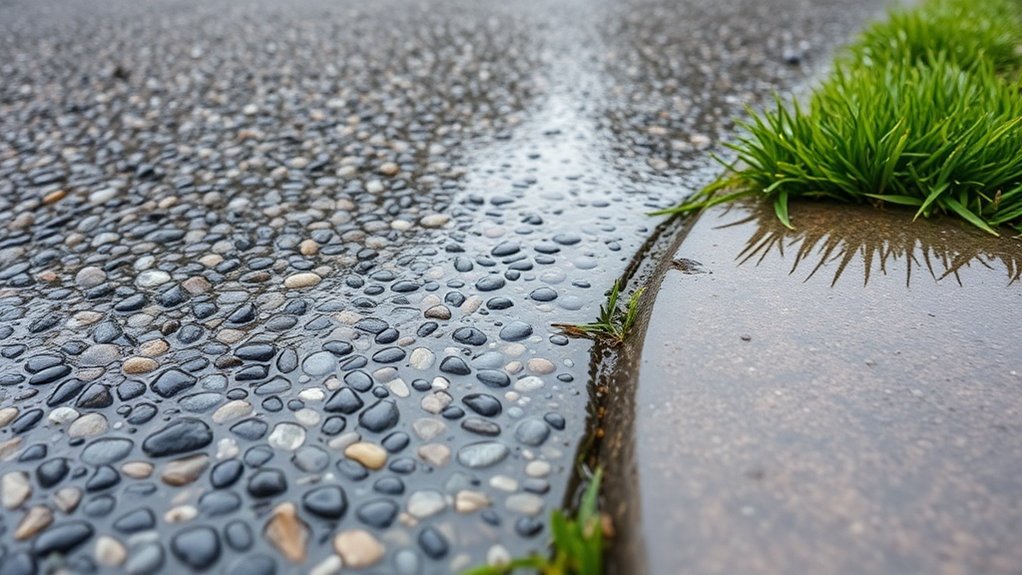
Maintaining a resin-bound driveway needn’t be complex. The British weather can take its toll, but several key measures will protect your investment. Apply quality sealants to guard against our UV exposure and frequent rain. Your driveway needs resealing every 1-2 years to keep it looking smart and working properly. Sort out proper drainage straightaway – you don’t want puddles forming, especially during winter frost. Choose materials suited to UK temperatures to prevent cracks developing. Regular sweeping and cleaning, particularly after autumn leaf fall, will keep your driveway in top shape. A properly installed frost-resistant base is crucial for our climate.
| Strategy | Benefits | Frequency |
|---|---|---|
| Apply Protective Sealants | Shields against UV, prevents staining | Every 1-2 years |
| Optimise Drainage | Reduces water pooling, prevents heave | Regularly |
| Use Appropriate Materials | Enhances flexibility and durability | At installation |
| Implement Routine Cleaning | Eliminates debris, maintains aesthetics | Seasonal |
Frequently Asked Questions
Can Resin-Bound Driveways Be Installed Over Existing Surfaces?
Resin-bound driveways can indeed be laid over existing surfaces, provided they’re stable and in decent nick. A solid concrete or tarmac base works brilliantly, saving you the faff and expense of ripping up the old surface. Just ensure the existing surface is clean, crack-free and properly prepped – a bit like painting a wall, the groundwork makes all the difference. The base needs to be structurally sound to prevent any wobbles or dips down the line. A thorough clean and prime is essential for proper bonding, much like getting a good grip on your morning tea cup.
How Do Resin-Bound Driveways Compare in Cost to Other Materials?
Resin-bound driveways cost more initially than traditional tarmac or concrete surfaces. Whilst you’ll pay roughly £50-£75 per square metre for resin compared to £30-£45 for tarmac, the durability and minimal upkeep often prove more cost-effective over time. A typical UK household driveway lasting 20+ years with resin requires little more than occasional sweeping and jet washing, unlike concrete which may need repairs due to cracking or tarmac that can soften in hot summers.
Are There Color Options Available for Resin-Bound Driveways?
Resin-bound driveways come in a vast range of colours, from classic greys and browns to modern earthy tones. You can mix different shades to match your property’s exterior or create striking patterns. Common choices include silver-grey for contemporary homes and warm browns for traditional properties. The colour won’t fade over time, making it a practical long-term investment for your home.
Can Resin-Bound Driveways Be Repaired if Damaged?
Resin-bound driveways are indeed repairable if damaged. Much like fixing a chip in your car’s windscreen, small areas can be patched with matching resin mixture. Regular checks for cracks or loose stones, particularly after harsh weather, help catch issues early. Swift repairs prevent further deterioration and keep your driveway looking smart whilst maintaining its value.
What Is the Best Season for Installing a Resin-Bound Driveway?
The ideal seasons for installing a resin-bound driveway are spring and early summer. These months offer optimal temperatures (typically 5-30°C) and drier conditions, essential for proper curing. Installing during these periods helps prevent common issues like rain damage or poor bonding, ensuring your driveway lasts longer and performs better.
Conclusion
A well-installed resin-bound driveway stands up brilliantly to Britain’s varied weather patterns. Its thermal properties prevent cracking during summer heatwaves and winter freezes, whilst the UV-stable materials keep colours from fading in our rare but welcome sunny spells. The permeable surface handles our frequent rainfall particularly well, preventing those bothersome puddles common with traditional driveways. Regular sweeping and occasional pressure washing will keep your driveway looking smart and functioning properly. With these simple maintenance steps, your resin-bound surface should remain robust and attractive through countless British seasons.
